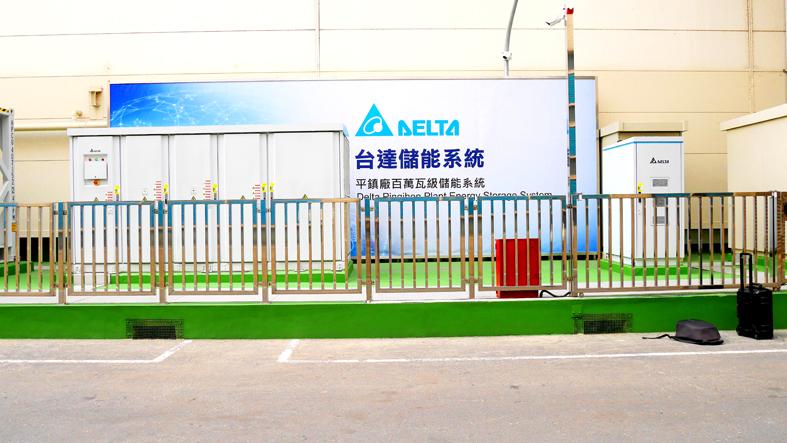Delta Electronics Inc (台達電) is planning to deliver three shipping container-sized energy storage systems to clients seeking to participate in Taiwan Power Co’s (Taipower, 台電) new energy trading platform, the nation’s leading power management solutions provider said yesterday.
The platform, which debuted earlier this year, is intended to make it easier for private owners of electrical equipment, such as generators or power storage units, to sell their energy resources to Taipower, giving the state-run utility more flexibility and the national grid more stability.
Delta is seeking business opportunties in the rapidly growing energy storage market, Delta senior director Paul Ai (艾祖華) said.

Photo: Fang Wei-chieh, Taipei Times
“Delta is a vertically integrated provider of power storage solutions from the design to the software,” Ai said. “Our solutions guarantee power stability and can start providing power on demand in 0.2 seconds, according to the needs of the grid.”
Ai said Delta’s container-sized battery solution is the first such unit to fulfill Taipower’s requirements and specifications.
The three container-sized 7.5 megawatt (MW) battery units are undergoing tests before being shipped to customers, Ai said.
The batteries would help make Taipower’s supply smoother and help the operators generate revenue, Ai said, adding that Delta’s own 5MW facility in Taoyuan makes “as much as NT$100,000 a day” through the Taipower platform.
Delta president and chief operating officer Simon Chang (張訓海) said that a trend toward decarbonization of power generation would lead to “explosive” growth in the power storage market.
“The risk of a global energy crunch and the increased pressure to decarbonize are stimulating the energy storage system market,” Chang said. “We anticipate very strong demand in the next five years, both domestically and globally.”
Delta is in talks with as many as 50 entities interested in its energy storage system, Chang said.
The company said it would fulfill 20MW in orders before the end of the year, 200MW next year and 1 gigawatt within the next five years.

In Italy’s storied gold-making hubs, jewelers are reworking their designs to trim gold content as they race to blunt the effect of record prices and appeal to shoppers watching their budgets. Gold prices hit a record high on Thursday, surging near US$5,600 an ounce, more than double a year ago as geopolitical concerns and jitters over trade pushed investors toward the safe-haven asset. The rally is putting undue pressure on small artisans as they face mounting demands from customers, including international brands, to produce cheaper items, from signature pieces to wedding rings, according to interviews with four independent jewelers in Italy’s main

Macronix International Co (旺宏), the world’s biggest NOR flash memory supplier, yesterday said it would spend NT$22 billion (US$699.1 million) on capacity expansion this year to increase its production of mid-to-low-density memory chips as the world’s major memorychip suppliers are phasing out the market. The company said its planned capital expenditures are about 11 times higher than the NT$1.8 billion it spent on new facilities and equipment last year. A majority of this year’s outlay would be allocated to step up capacity of multi-level cell (MLC) NAND flash memory chips, which are used in embedded multimedia cards (eMMC), a managed

Japanese Prime Minister Sanae Takaichi has talked up the benefits of a weaker yen in a campaign speech, adopting a tone at odds with her finance ministry, which has refused to rule out any options to counter excessive foreign exchange volatility. Takaichi later softened her stance, saying she did not have a preference for the yen’s direction. “People say the weak yen is bad right now, but for export industries, it’s a major opportunity,” Takaichi said on Saturday at a rally for Liberal Democratic Party candidate Daishiro Yamagiwa in Kanagawa Prefecture ahead of a snap election on Sunday. “Whether it’s selling food or

In the wake of strong global demand for AI applications, Taiwan’s export-oriented economy accelerated with the composite index of economic indicators flashing the first “red” light in December for one year, indicating the economy is in booming mode, the National Development Council (NDC) said yesterday. Moreover, the index of leading indicators, which gauges the potential state of the economy over the next six months, also moved higher in December amid growing optimism over the outlook, the NDC said. In December, the index of economic indicators rose one point from a month earlier to 38, at the lower end of the “red” light.